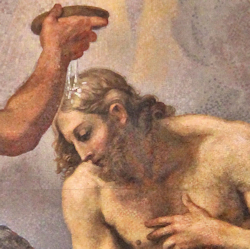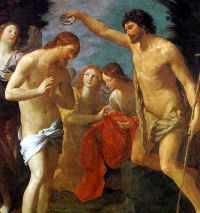» Enjoy our Liturgical Seasons series of e-books!
Today the Church celebrates the Solemnity of the Baptism of Our Lord. This brings to an end the season of Christmas. The Church recalls Our Lord's second manifestation or epiphany which occurred on the occasion of His baptism in the Jordan. Jesus descended into the River to sanctify its waters and to give them the power to beget sons of God. The event takes on the importance of a second creation in which the entire Trinity intervenes.
In the Eastern Church this feast is called Theophany because at the baptism of Christ in the River Jordan God appeared in three persons. The baptism of John was a sort of sacramental preparatory for the Baptism of Christ. It moved men to sentiments of repentance and induced them to confess their sins. Christ did not need the baptism of John. Although He appeared in the "substance of our flesh" and was recognized "outwardly like unto ourselves," He was absolutely sinless and impeccable. He conferred upon the water the power of the true Baptism which would remove all the sins of the world: "Behold the Lamb of God, behold Him Who takes away the sin of the world."
Many of the incidents which accompanied Christ's baptism are symbolical of what happened at our Baptism. At Christ's baptism the Holy Spirit descended upon Him; at our Baptism the Trinity took its abode in our soul. At His baptism Christ was proclaimed the "Beloved Son" of the Father; at our Baptism we become the adopted sons of God. At Christ's baptism the heavens were opened; at our Baptism heaven was opened to us. At His baptism Jesus prayed; after our Baptism we must pray to avoid actual sin.
— Excerpted from Msgr. Rudolph G. Bandas
Click here for commentary on the readings in the Extraordinary Form of the Roman Rite.
Customs on the Feast of the Baptism of the Lord
In the Ukraine the faithful gather in the front of the church where a cross of ice is placed. Since there are no rivers near churches, a tub is filled with water and is placed in front of the ice cross. During special and very unique services the water is blessed and brought home. This is taken in before breakfast is eaten. The remains are kept during the year to keep the home safe from fire, lightening and sickness.
The priest visits his parishioners to bless their homes with the holy water that the New Year may be one of cooperation with the gift of God; His Son and the participation in the Life He has come to lead us in toward Salvation. The evening meal is very much a repeat of the Holy Supper except that there are no restrictions on meat and dairy products. It starts with Kutia, which has been saved from Christmas Eve.
The Seventennth Day of Christmas
Meditation—The Baptism of Christ
 And Jesus being baptized, forthwith came out of the water; and lo, the heavens were opened to Him: and He saw the Spirit of God descending as a dove, and coming upon Him. And behold a voice from heaven saying: This is My beloved Son, in Whom I am well pleased."
And Jesus being baptized, forthwith came out of the water; and lo, the heavens were opened to Him: and He saw the Spirit of God descending as a dove, and coming upon Him. And behold a voice from heaven saying: This is My beloved Son, in Whom I am well pleased."
Jesus stoops so low as to mingle with the multitude of sinners, and forthwith the heavens are opened to magnify Him—He acknowledges Himself worthy of the strokes of divine justice, and behold, the Father declares that He takes all His delight in Him: Humiliavit semetipsum...propter quod et Deus exaltavit illum.
It is at this moment that the mission of Jesus, as One sent by God, is declared authentic. The Father's testimony accredits, so to speak, His Son before the world, and hence this testimony relates to one of the characters of Christ's work as regards ourselves.
The mission of Jesus has a double aspect: it bears at the same time the character of redemption and of sanctification. It is to redeem souls, and, this done, to infuse life into them. That is the whole work of the Saviour.
—Excerpted from Christ in His Mysteries by Dom Columba Marmion



